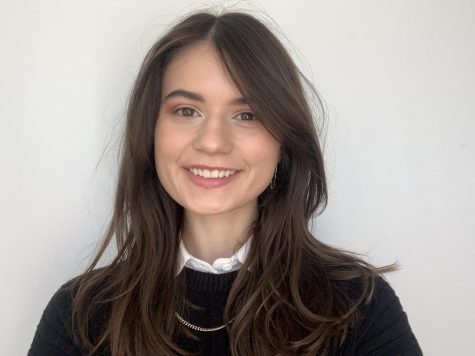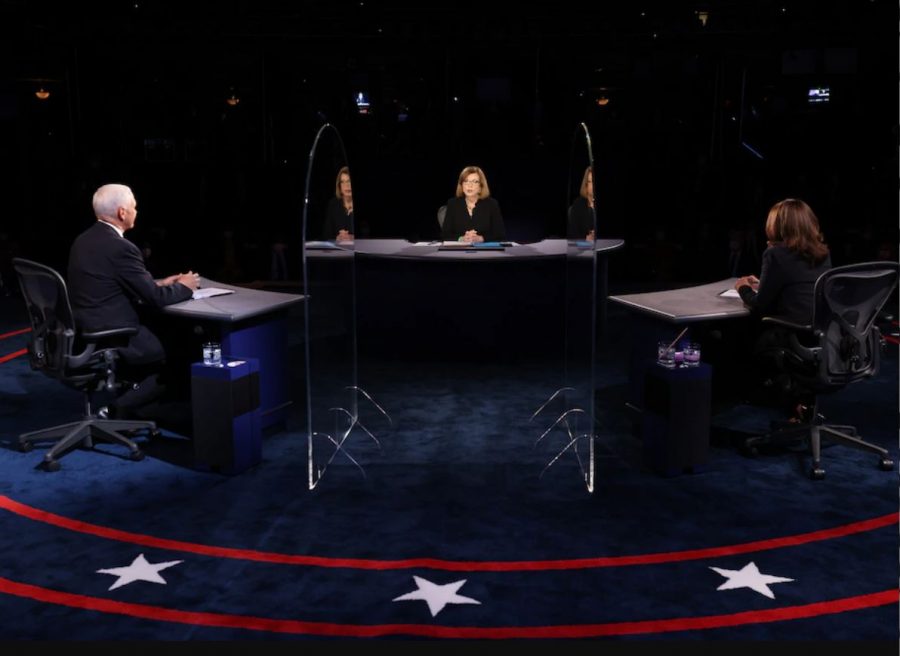College Democrats and College Republicans Comment About Vice Presidential Debate
Susan Page, the Washington bureau chief for USA Today and the moderator of the debate, began the event by reminding candidates to maintain decorum (Courtesy of the Washington Post).
Vice President Mike Pence and California Senator Kamala Harris sparred over coronavirus response and other pressing topics during the vice presidential debate on Wednesday, Oct. 7.
The debate, held at the University of Utah in Salt Lake City, was the only debate scheduled between the two vice presidential candidates. The first portion of the event, which began at 9 p.m., featured criticisms from Harris regarding the current administration’s handling of the COVID-19 pandemic this year.
“[It’s] the greatest failure of any presidential administration in the history of our country,” Harris said.
She criticized President Donald Trump and Pence for failing to be transparent about the threat COVID-19 posed to the country, referencing interviews with Trump published by Bob Woodward last month.
“This administration has forfeited its right to reelection,” Harris said.
Pence responded by praising Trump’s decision to bar travelers from China from entering the United States in the early days of the pandemic and accusing Biden and Harris of not trusting Americans to make decisions about their own safety.
The two candidates also clashed over the issue of a coronavirus vaccine. Harris said she would put her trust in scientists but not the president when it comes to an eventual vaccine and said: “If Donald Trump says we should take it, I’m not taking it.”
Pence responded by accusing Harris of putting politics over public health. “Your continuing undermining of the confidence in a vaccine is unacceptable,” he said.
Claire McDonnell, FCRH ’21, president of the College Democrats of Fordham University, said she felt the portion of debate surrounding the coronavirus response was Harris’s strongest moment.
“She was incredibly critical of the Trump administration’s negligent response to the coronavirus, which was not something Pence could convincingly deny or turn around on Harris,” said McDonnell.
The vice presidential candidates also clashed over the future of the Supreme Court. Pence asked Harris directly if she and Biden planned to pack, or expand, the court upon election. Harris avoided a direct answer, instead choosing to criticize the resumés of judges that Trump has appointed to federal courts during his term.
Timothy Kyle, FCRH ’21, president of the Fordham University College Republicans, said he thought this was one of Harris’s worst moments of the night.
“[It was] damning in its weakness and lack of conviction,” he said.
He also said her ambiguous stance raised serious concerns.
“We are a republic of three co-equal branches of government, each a check on another,” said Kyle. “The vice presidential candidate for one of our two parties refused to denounce a scheme to throw that out of balance.”
During the portion of the debate focused on climate change, Pence mostly steered the discussion towards the specific issue of fracking and accused the Biden ticket of supporting a total ban on the practice. Harris denied this.
“Joe Biden will not ban fracking. That is a fact,” she said.
McDonnell said she was disappointed by this narrow discussion surrounding climate change and environmental policy plans.
“I believe the environment is the most important issue we are voting on this November,” she said. “I would have liked a more comprehensive discussion of this issue rather than both sides trying to make an appeal to rural Pennsylvanians in their answers.”
The debate, on the whole, marked a departure from the chaotic and often hostile back and forth between President Donald Trump and former Vice President Joe Biden in the first presidential debate, said Dr. Robert Hume, a Fordham political science professor.
“It actually felt like a debate, as opposed to the free for all that we saw last week,” he said.
Susan Page, the Washington bureau chief for USA Today and the moderator of the debate, began the event by reminding candidates to maintain decorum.
“We want a debate that is lively, but Americans also deserve a debate that is civil,” said Page.
Though there were far fewer conflicts between candidates than the first debate between Biden and Trump, there were still moments when Harris pushed back when Pence interrupted her.
“Mr. Vice President, I’m speaking” was a line Harris used several times during the event.
Monika McDermott, a Fordham political science professor, said these moments point to the fine line Harris needed to walk in her back and forth with the vice president.
“Harris had to worry about the double bind that all women candidates face — being strong and forceful, but also caring and empathetic,” McDermott said. “Harris did what she needed to do, which was to avoid negative sex stereotypes of aggressive women and act presidential.”
McDermott also said that Pence’s repeated interruptions and “disregard for the female moderator” were emblematic of the kind of gender dynamics that permeates everyday life in America.
The less heated nature of this debate also reveals the stark contrast between Trump and his vice president, said Kyle.
“Pence is everything Trump is not,” said Kyle. “While Trump is loud, abrasive and domineering, Pence is much more reserved, articulate and genteel.”
Kyle said that these differences sometimes served as an obstacle for Pence during the debate, especially when he was asked to comment on the president’s statements.
“Pence was most awkward when forced to parrot Trump himself,” said Kyle. “He’s obviously cut from different cloth than the President and having to defend Trump’s often hyperbolic or outlandish claims obviously isn’t his most comfortable place.”
The vice presidential debate ended on a similar note with the presidential debate that occurred the previous week, with Pence and Harris both commenting on the legitimacy of the upcoming election. Their responses mirrored those from Trump and Biden. Pence expressed concerns that universal mail-in ballots will contribute to election fraud, and Harris emphatically urged viewers to vote using the method most convenient for them.
McDermott said she felt the debate was informative, but said she doubts it will have any significant effect on the last stretch of the election.
“If there’s one thing we know from political science research, and experience, it’s that vice presidential debates don’t matter in elections,” she said. “The candidates both did a competent job, and as a result, nothing should change.”

Abbey Delk is a junior from Wheeling, West Virginia, double majoring in English and journalism and minoring in film & television. Her career at the...







































































































































































































